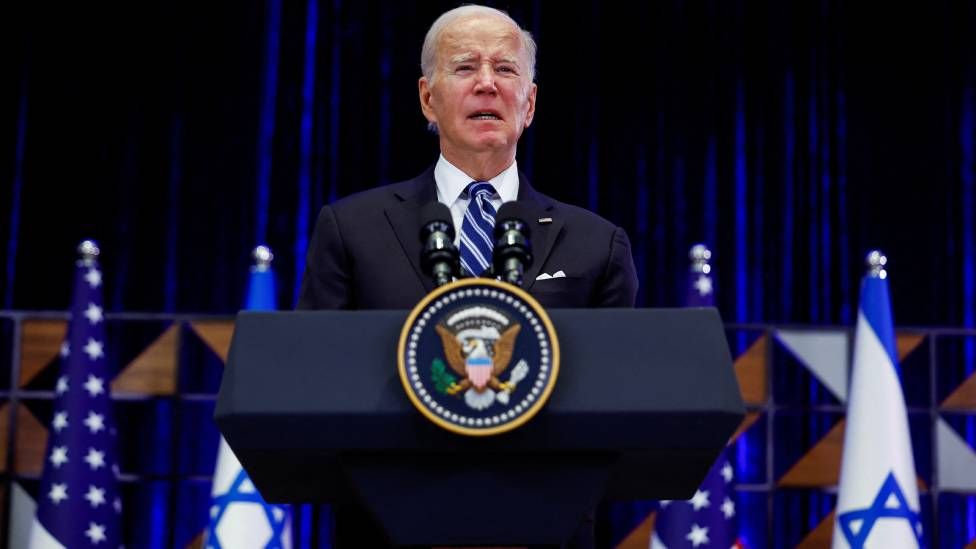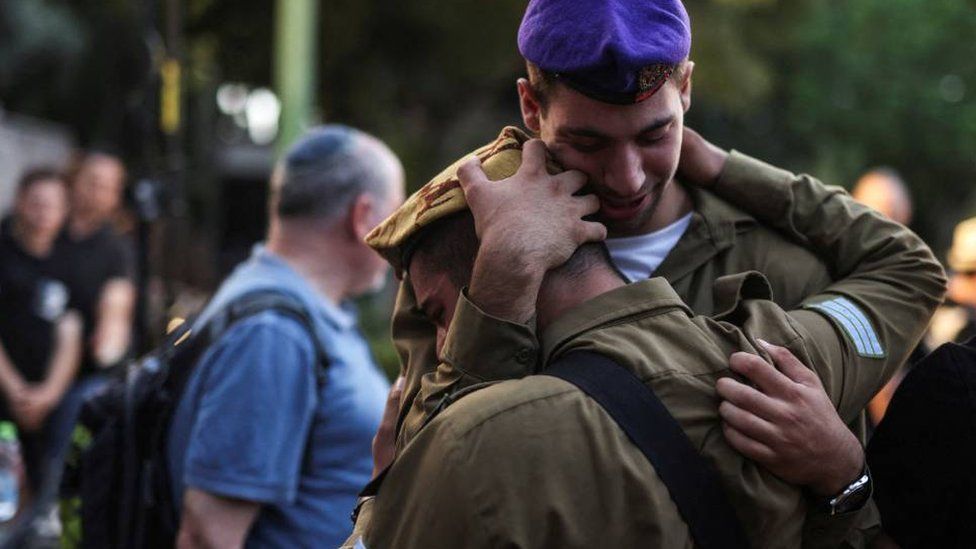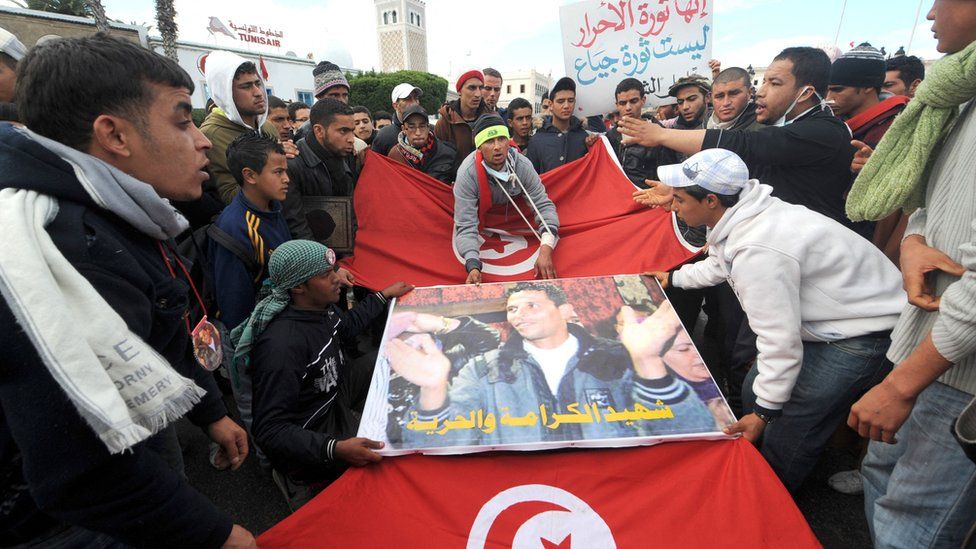Even before the deadly blast at Al-Ahli hospital in Gaza, Joe Biden’s full-throated support for Israel had convinced Palestinians and millions of other Arabs that the United States was more than simply Israel’s most important supporter. They believed the Americans were also complicit in everything Israel was doing in Gaza, including killing children.
The bitter dispute over who was responsible for the attack will not change many minds. Twelve days of war have ramped up hatred and division.
Israel produced a detailed rebuttal of accusations that it had attacked Al-Ahli. It displayed evidence that it said proved a missile fired by Palestinian Islamic Jihad had malfunctioned and dropped well short of its target in Israel.
For Palestinians – not just supporters of Hamas – the piles of bloodstained body bags were all the proof they needed. For them, the difference at Al-Ahli was not of principle but of degree. Israel has been killing scores of Palestinians every day since it responded to the Hamas surprise attack, which Prime Minister Benjamin Netanyahu reminded Mr Biden had killed at least 1,400 people, mostly Israeli civilians. Al-Ahli was, for Palestinians, more proof of Israel’s disregard for their lives.
The first reports of the destruction of the hospital emerged as the engines of Air Force One were warming up to bring Joe Biden to the Middle East. Before it could take off his schedule was in tatters.
President Biden has a deep commitment to Israel. It must have seemed natural to him to fly into Tel Aviv to show his support and offer a public embrace to Mr Netanyahu.
Mr Biden had been hoping somehow to balance that out at a hastily-arranged summit in Amman, the Jordanian capital, where he planned to meet the king of Jordan, the president of Egypt and the Palestinian president.

But Jordan cancelled because of Al-Ahli. The Palestinian president, Mahmoud Abbas, hurried back to his HQ in Ramallah on the Israeli-occupied West Bank. Saudi Arabia, the United Arab Emirates (UAE), Egypt and Jordan itself released statements condemning Israel.
The trip became much harder for President Biden. Heads of state usually only travel on diplomatic missions once the hard work of negotiation has been done and a deal is ready to be signed.
Coming to Tel Aviv was a gamble for President Biden. He wanted to ease Gaza’s humanitarian catastrophe, while supporting Israel’s war effort – perhaps an impossible circle to square with Mr Netanyahu.
But a deal emerged from their meeting. Israel was promised more military aid. In return it agreed to let convoys carrying food, water and medicine enter southern Gaza from Egypt. Hospitals are desperate for fuel for their generators, but when the deal was announced it was not mentioned.
Apart from supporting the Israelis and reminding them to observe the laws of war, Mr Biden also wants to reinforce the message that the war must not spread. He had already deployed two aircraft carrier battle groups to the eastern Mediterranean, to show Iran and its ally in Lebanon, the Hezbollah militia and political movement, that they would have the US to reckon with if they intervened.
One reason why leaders inside and outside the Middle East are struggling with the renewed war between Hamas and Israel is because they are in unknown territory. The old certainties had become comforting assumptions. But now they are mostly shattered and gone.
The Middle East looked to be familiar ground before the Hamas attacks in Israel on 7 October. A status quo existed. No leader in the region, and among its allies, liked it much but at the very least it seemed to promise stability.

Most Palestinians were as surprised as anyone else when Hamas attacked. Some had criticised Hamas for supposedly forgetting that its name is an Arabic acronym for Islamic Resistance Movement.
Mr Netanyahu has been condemned by his many political enemies in Israel for being asleep on the job when Hamas invaded, and for presiding over a catastrophic military and intelligence failure. Israelis thought their government could keep them safe.
Another illusion related directly to Mr Netanyahu was his assumption that the Palestinians could be managed without allowing them independence. Part of that involved making deals with Hamas over issues like the numbers of workers allowed back into Israel.
At the same time, using a classic tactic of divide and rule, Mr Netanyahu worked to undermine the Palestinian Authority, the main rivals of Hamas for leadership of the Palestinians. The PA took part in years of ultimately fruitless peace talks, and recognised Israel a generation ago. But to get it talking again, Israel would have to discuss transferring land to the Palestinians for a future state with a capital in Jerusalem.
That idea is out of the question for Mr Netanyahu in his current incarnation as the leader of a government sustained by extreme religious nationalists. His record suggests he has never wanted to make those concessions. It was easier for him to find a way to insist Israel had no partner for peace. Mr Netanyahu, or a successor, will have to change their thinking if they want to find a way to save the next generation from more war.
For leaders of the US’s Arab allies, there has also been a sharp reminder that the Palestinians cannot be ignored. Jordan and Egypt have long-established peace treaties with Israel. The UAE normalised relations in the Abraham Accords. All were hoping to benefit from Joe Biden’s plan to create a new Middle East, and a foreign policy achievement to boast about, by brokering a deal in which Israel and Saudi Arabia would recognise each other in return for security guarantees from the US. Mr Biden’s officials thought they were making progress. Now a Saudi-Israeli rapprochement is way off the agenda.
And for Arab kings, princes and presidents, the war in Gaza and the attack on the hospital is also about the return of nightmares. At the end of 2010 a frustrated and furious market trader in Tunisia set himself on fire to protest against corrupt and bullying officials. It set off the Arab uprisings of 2011, which terrified leaders who thought they might lose everything – not just power and wealth but perhaps even their lives.

If the death of an angry young man in Tunisia could be the spark for revolutions, what could be the price of a war that kills thousands of Palestinian civilians?
Certainties have been shown, in less than two weeks of bloodshed, to be built on sand. The new status quo will emerge from war. Perhaps the shock it creates will force new thinking. If it simply reinforces the old ways, the outlook is grim.










7 comments
whoah this blog is excellent i love reading your posts. Keep up the great work! You know, many people are looking around for this info, you could aid them greatly.
Lovely site! I am loving it!! Will be back later to read some more. I am taking your feeds also.
I’m still learning from you, but I’m trying to reach my goals. I certainly liked reading everything that is posted on your site.Keep the information coming. I loved it!
I conceive this site holds some really great information for everyone. “He who has not looked on Sorrow will never see Joy.” by Kahlil Gibran.
I love your blog.. very nice colors & theme. Did you create this website yourself? Plz reply back as I’m looking to create my own blog and would like to know wheere u got this from. thanks
I’ve read some good stuff here. Definitely value bookmarking for revisiting. I wonder how so much attempt you put to create such a great informative site.
Good V I should certainly pronounce, impressed with your site. I had no trouble navigating through all tabs as well as related information ended up being truly easy to do to access. I recently found what I hoped for before you know it at all. Reasonably unusual. Is likely to appreciate it for those who add forums or something, site theme . a tones way for your customer to communicate. Excellent task..